Families aren’t made from cookie cutters, are they? All across the world, parents are deciding with love and care that one child is the perfect fit for them. Especially in the U.S., more and more families are embracing this idea.
It’s a big decision, and it’s changing the way we think about what a family should look like. So, let’s sit down together, like friends over a cup of tea, and talk about what life is really like for these special kids, the only children.
There are joys, yes, and some challenges too…but most of all, so much promise for the future. Now, let’s dive in, statistics first, and then we’ll get to the heart of things.
Table of Contents
Highlights: The most important ‘only child statistics’
- A World of only children: The number of only-child families is steadily rising, with the U.S. set to see a huge increase by 2050.
- Europe’s variety: Each European country has its own story: In Portugal, 57% of families have one child, while Germany’s figure sits at 24%. A whole spectrum of family choices!
- America’s shift: Did you know that in the past 40 years, the number of American women having just one child has doubled? That’s a huge change in how we think about ‘family’.
- Asia – A land of contrasts: Countries like Bangladesh have a very high percentage of one-child households, but in bustling Indian cities, that number is much lower. Asia shows us how traditions and changing times can shape our choices.
- The ups and downs: While only children often shine in school, there are challenges they face too. Parents need to be mindful of things like higher chances of obesity and the weight of sometimes unrealistic expectations.
- What about the money side? There are economic reasons why families might choose just one child. In Ireland, most one-child families have two working parents…it makes sense financially. However, some only children do experience poverty, reminding us that even within this trend, there are many different realities.
- Expert insight: Dr. Newmann, a child psychologist, offers her thoughts: “Only children do benefit from their parents’ concentrated love and care, but sometimes the social learning curve is steeper. It’s a mixed bag, just like any family type.”
- The bond of love: Parents and their only children often share a powerful connection. It brings incredible closeness, but as kids get older, striking out on their own can feel a bit tougher.
- Our communities must change too: In a country like the U.S., the more only children we have, the more our schools, programs, and even ways of thinking about kids will need to shift and adapt.
- The future is…flexible! Family sizes, what’s ‘normal’ – it’s all changing. Our idea of the ‘perfect family’ has to change with it. Understanding, flexibility, and a whole lot of love, that’s the key.
As the dynamics of family structures transform, the rise of the only-child family is becoming increasingly evident.
Within this evolution, a wealth of data unveils fascinating trends, reshaping our understanding of family life. Let’s dive deeper into this phenomenon with only child statistics.
Singletons have advantages over laterborns from larger families in educational expectations and grades and spend more time on homework than laterborns from families with three or more siblings.
Child Development Research
The academic advantages don’t stop at homework time. Only children are more likely to attend a selective college compared to children from larger families. Why? It likely comes down to what researchers call “cultural capital”—only children tend to accumulate more exposure to museums, books, and enriching experiences simply because parents can invest more time and resources into one child. It’s not about being “better”—it’s about having more opportunities to explore and grow.
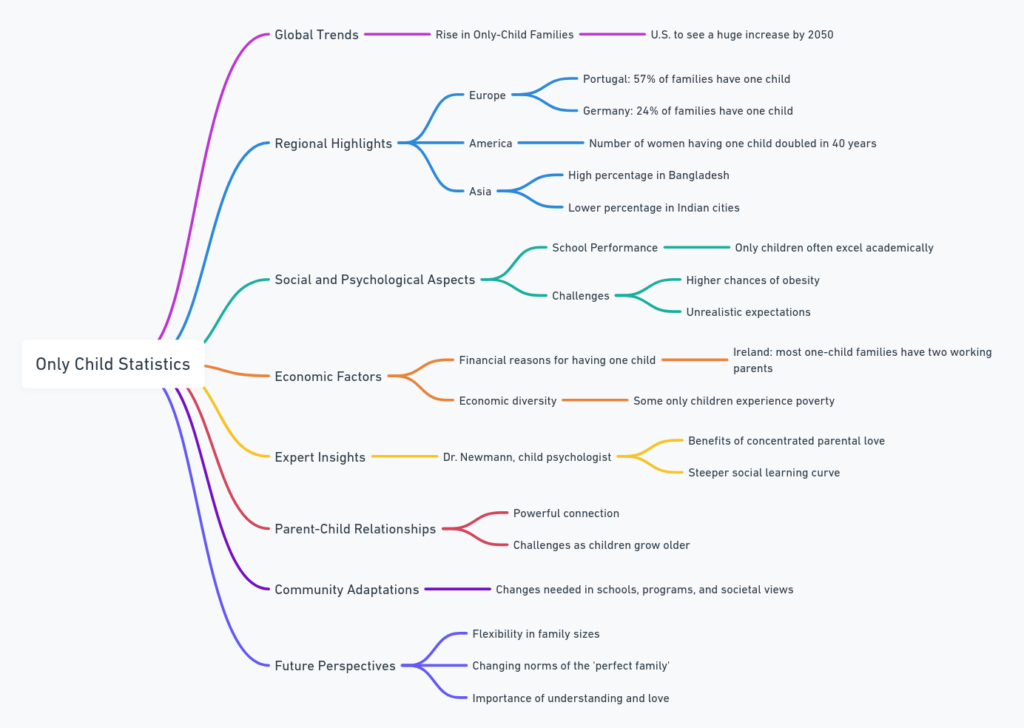
The global perspective of the one-child family
The world over, the family size is undergoing a shift. The average percentage of only children in families stands at around 20%.
Here’s something that might surprise you: the U.S. birthrate has dropped to its lowest point ever—just 1.6 children per woman. And it’s not just happening here. The United Nations tells us that fertility levels of less than two births per woman are becoming the new normal across the globe—in over 55% of countries, in fact!
Let that sink in for a moment. The number of women reaching the end of their childbearing years with just one child has actually doubled in a single generation—from 11% in 1976 to 22% in 2015. The average American family has downsized too, going from 3.7 children in 1960 to just 1.9 today. Families are changing, and it’s a beautiful thing to see parents making thoughtful choices about what works best for them.
Yet, projections suggest that the only-child family trend will surge, especially in the U.S., where it’s predicted to double by 2050.
Europe’s one-child paradigm
Europe paints a picture of embracing the one-child family trend. With an average of 47.5% of families with a single child, it’s a continent where the family dynamics are visibly changing.
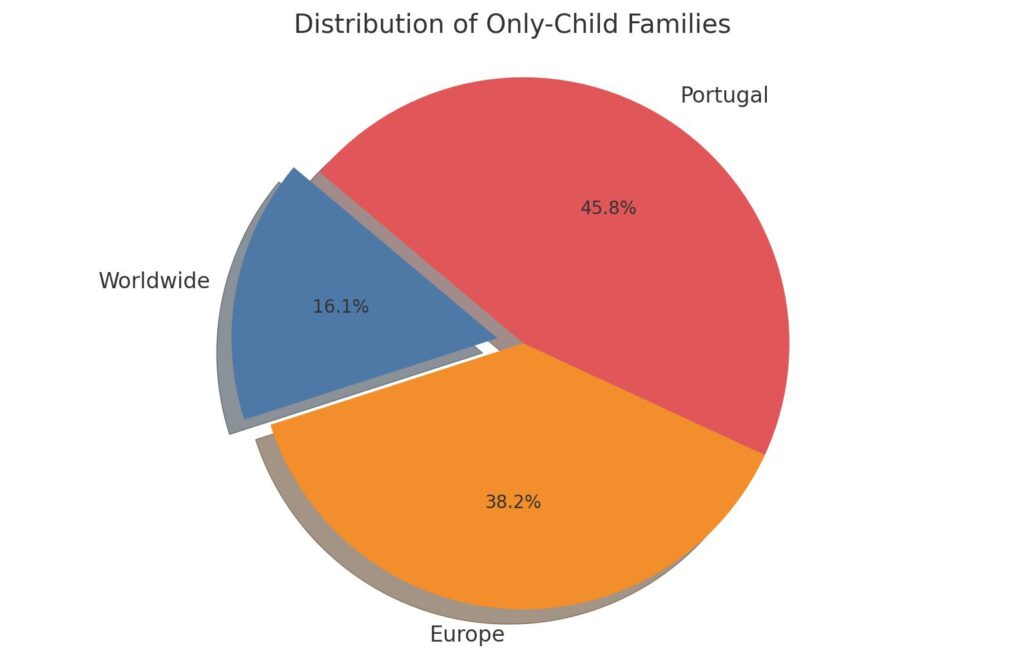
While Portugal leads with 57% of only-child families, Germany’s 24% suggests varying family relationships and societal norms across European nations.
North America’s evolving family dynamics
Census data from the U.S. underscores the fast-growing prominence of the one-child family. The number of women concluding their child-bearing years with a single child has risen dramatically.
This shift in family planning and birth rate is evident in the jump from 11% in 1976 to 22% in 2015. Parallelly, Canada’s trend showcases an increase from 38.9% in 1961 to 43.7% in 2016.
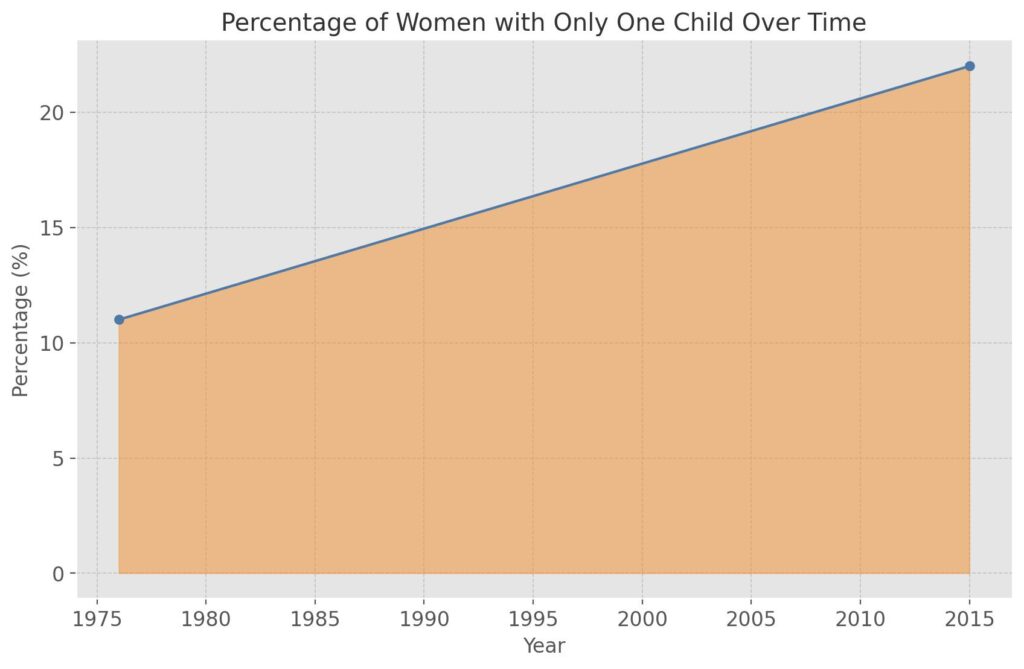
The Asian landscape
Asia offers a diverse picture. Bangladesh, with 71.6% of households with up to one child in 2019, contrasts starkly with urban India’s 27%. South Korea’s 216% rise in only-child families from 1981 to 2015 highlights rapid changes in family planning and societal norms.
Only child stats
General family statistics
| Statistic | Value |
|---|---|
| Average % of only children in families globally | 0.2 |
| World average of people per family (2019) | 4.9 |
| Number of families in the U.S. with three or more children under 18 (2021) | 7.01 million |
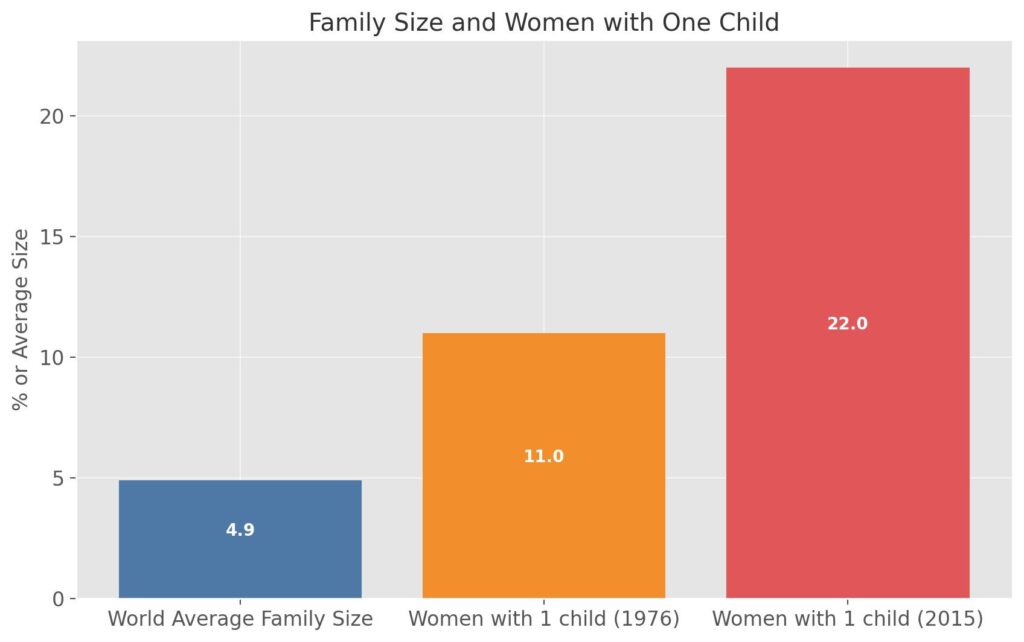
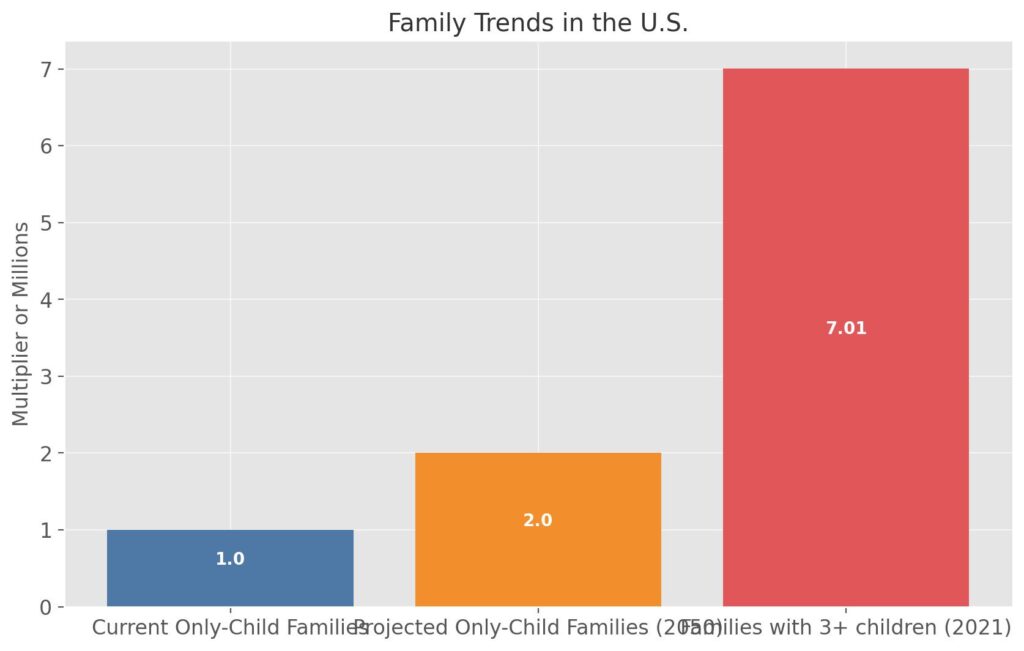
Only child statistics: global and by country
| Country/Area | Statistic | Value |
|---|---|---|
| U.S. | Expected growth of only child families by 2050 | Double |
| U.S. | Fastest growing family unit | One-child families |
| U.S. | Women who reached the end of child-bearing years with only one child (2015 vs 1976) | 22% vs 11% |
| U.S. | % of only children living in poverty | 0.29 |
| U.S. | % of married couples with one child | 0.263 |
| Europe | Average % of one-child families | 0.475 |
| Portugal | % of only-child families | 0.57 |
| Germany | % of only-child families | 0.24 |
| Canada | Families with only one child (2016 vs 1961) | 43.7% vs 38.9% |
| Bangladesh | % of households with up to 1 child (2019) | 0.716 |
| India (Urban) | % of families with only one child | 0.27 |
| Ireland | % of couples with one child who are both working | 0.619 |
| Japan | % of children in single-mother households who are only children | 0.477 |
| Brazil | Only-child families (2009 vs 1976) | 62.9% vs 42.4% |
| South Korea | Growth of families with one child (1981-2015) | Increased by 216% |
| Australia | % of families with one child | 0.3 |
| Italy | % of families composed of one parent and one child | 0.137 |
Behavioral and psychological traits of only children
| Statistic | Value |
|---|---|
| % of all children with make-believe friendships | 0.65 |
| Achievement motivation and personal adjustment | Higher in only children |
| Ambition, confidence, intelligence, and independence in adulthood | More in only children |
| Comparison with first-borns | Only children surpass in character and positive relationships with parents |
| Happiness, popularity, and self-esteem | Comparable for only children |
| Selfishness and lack of social skills | Not more in only children |
| IQ | Higher in only children |
| Excellence in education and occupation in adulthood | More likely for only children |
| Likability by classmates | Only children are less liked |
| Happiness in childhood and adolescence | Decreased by siblings |
| Hours spent caring for aging parents | Not more for only children |
| Obesity | Downside of being an only child |
| % of only children without close friends | 0.23 |
The only child: busting myths and understanding realities
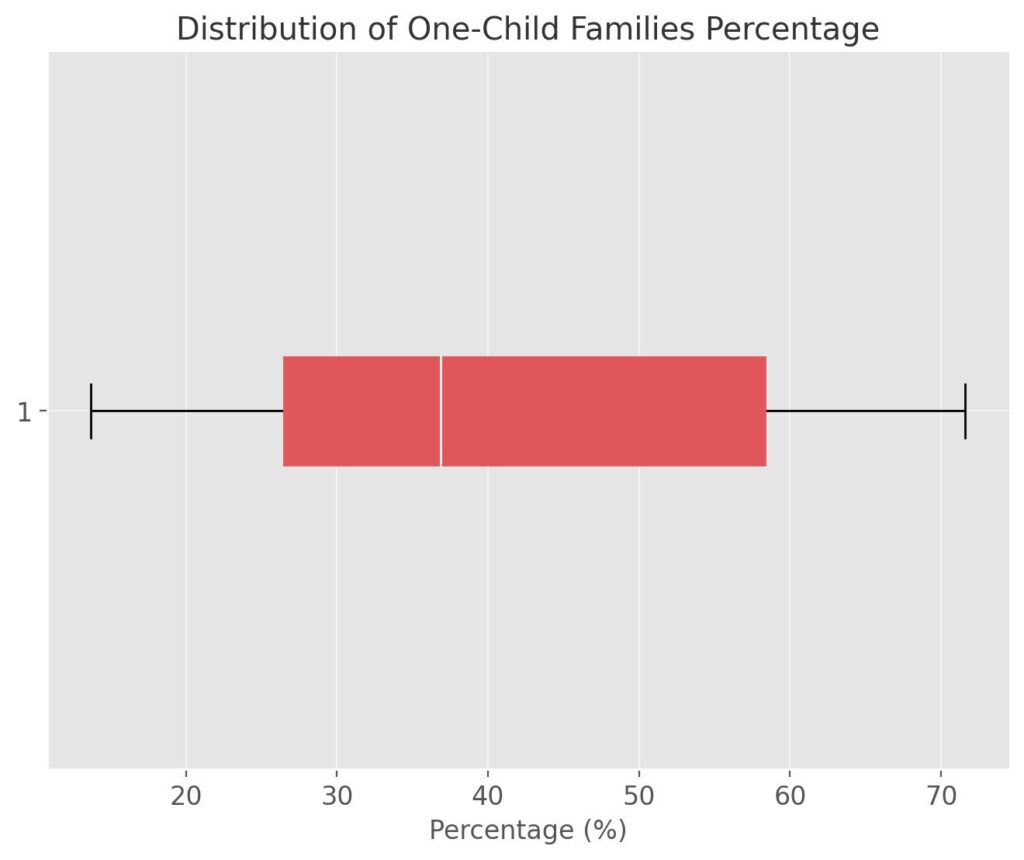
The stereotype surrounding only children tends to be laden with misconceptions. Research, however, paints a more nuanced image.
The developmental edge
Studies from the University of Texas have shown that only children have an advantage in personal development. They often surpass their first-born counterparts in character and exhibit stronger bonds with their parents.
Such children tend to be more ambitious, confident, and independent in adulthood. The child development trajectory for only children appears to be positively influenced by the undivided attention they receive.
The social fabric
Contrary to popular belief, only children are not intrinsically more selfish or devoid of social skills. The digital archive of multiple studies suggests a different narrative.
Around 65% of all children, irrespective of being only kids or children with siblings, foster make-believe friendships. The only child syndrome, which suggests that only children are inherently less social, is a myth.
Let’s put another myth to rest, shall we? A large study of nearly 8,700 people found absolutely no evidence that only children are more narcissistic than kids with siblings. None. Zero. So if anyone tries to tell you that your only child will grow up self-centered, you can politely point them to the research!
Now, there are some small differences worth knowing about. Only children do tend to score slightly lower on ‘agreeableness’ in personality tests—but honestly? This might just mean they’re comfortable standing their ground. They also tend to be more independent and self-reliant (no surprise there!).
Here’s a fun one: about 25% of only children describe themselves as perfectionists and overachievers—right alongside oldest siblings. They set the bar high for themselves, and often soar right over it.
Intellectual growth and challenges
Only children tend to have higher IQs, a testament to the focused resources and attention they receive from parents especially invested in their upbringing.
And here’s something truly fascinating that researchers discovered: only children in China showed greater gray matter volume in the parietal lobe—that’s the part of the brain linked to flexibility and imagination! It seems like all that solo playtime might actually be wiring their brains for creativity. How wonderful is that?
However, they also face unique challenges. The risk of obesity is higher among children, possibly due to parental overindulgence or a lack of physical activity in the absence of siblings.
Now, let’s talk about health for a moment—because it’s not all sunshine and rainbows, and that’s okay. A European study found that only children had up to 7 times higher risk of obesity compared to kids with siblings. Why might this be? It could be less active play, or perhaps a little extra indulgence from devoted parents (we’ve all been there!).
Interestingly, a study from China found that only children are more prone to nearsightedness (myopia)—likely because they tend to spend more time with indoor activities like reading and screens. But here’s a silver lining: only children are actually less likely to catch infectious diseases like the flu from household members, simply because there are no school-age siblings bringing germs home. Every cloud has its silver lining, right?
Economic strains and societal implications
The economic implications of the rise in one-child families are multifaceted. In the U.S., a concerning 29% of children live in poverty.
This statistic may reflect smaller families’ challenges, especially in urban settings.
On the other hand, in Ireland, where 61.9% of couples with a single child are both employed, the trend might suggest an economic rationale for having fewer children.
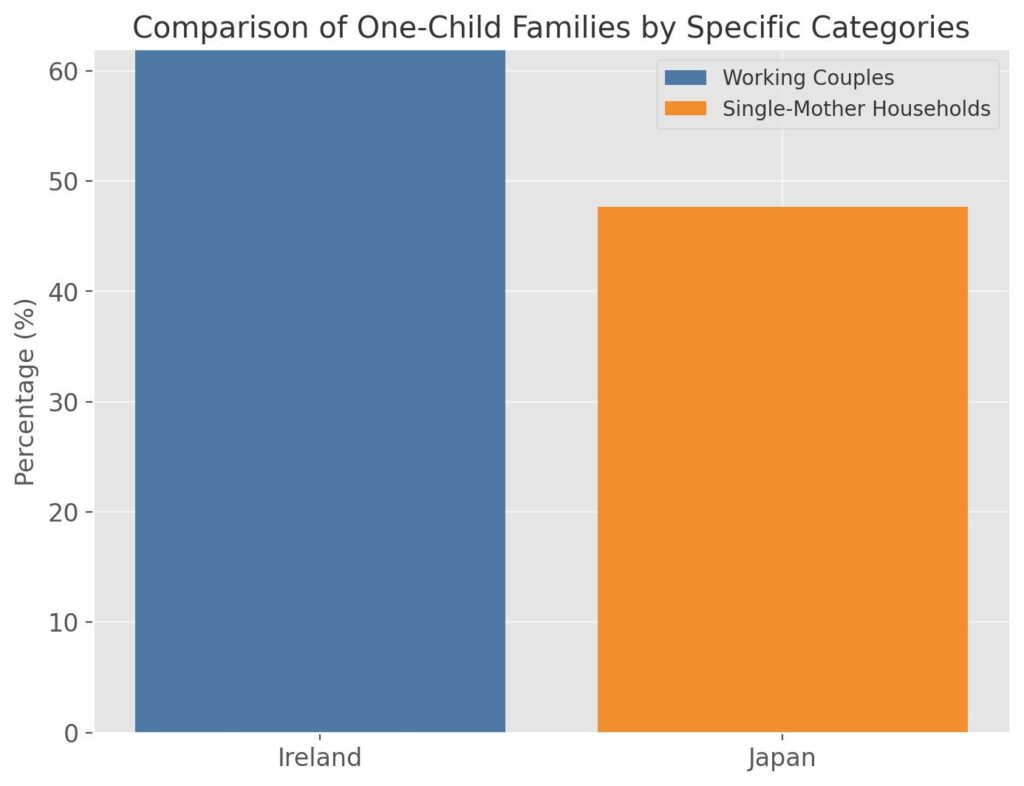
Interview with Dr. Newmann: The psychological impact of being an only child
Families are changing. Those reports about more and more parents choosing to have just one child? They sparked questions for all of us, didn’t they? What does this mean for the kids, and for our communities? To get some answers, I had the privilege of speaking with Dr. Newmann. She’s a South African psychologist, a warm and insightful woman dedicated to understanding children and how they grow within their families. So, let’s dive in…
Amy: Dr. Newmann, thank you for joining us. Recent statistics show a significant increase in only-child families globally (Patterns and trends in household size and composition: Evidence from a United Nations dataset). What do you make of this trend?
Dr. Newmann: It's a pleasure to be here. The rise in only-child families is a reflection of our changing world. Economic pressures, career aspirations, and personal choices make many choose smaller families. While this has benefits, it also poses unique challenges for the child's social and psychological development.
Amy: Can you elaborate on the benefits and challenges you just mentioned?
Dr. Newmann: Certainly. On the one hand, only children often receive more resources and attention from their parents, leading to higher achievement motivation and personal adjustment. They tend to have higher IQs and excel in education and occupation as adults. However, they may also encounter challenges such as heightened parental expectations, potential loneliness, and a lack of sibling relationships, which can be crucial for social learning.
Amy: The data suggests that only children may have stronger bonds with their parents. How does this affect them long-term?
Dr. Newmann: Strong parent-child bonds are generally positive. They can lead to increased confidence and ambition. However, these bonds can also create a dependency that makes the transition to independence more challenging. Parents need to encourage autonomy to balance this close relationship.
Amy: There's a stereotype that only children are more selfish and lack social skills. Does the data support this?
Dr. Newmann: Not at all. The stereotype is outdated and unsupported by current research. Only children are not inherently more selfish or socially inept. They often develop strong social skills through interactions outside the family unit. It's crucial to provide them with opportunities to engage with peers from an early age.
Amy: With the projected increase in only-child families, especially in the U.S., what implications does this have for society?
Dr. Newmann: As family structures evolve, so must our societal support systems. Education, community programs, and policy-making must consider the growing number of only-child families. This includes providing socialization opportunities for only children and supporting parents in understanding the unique developmental needs of their child.
Amy: What advice would you give to parents raising an only child?
Dr. Newmann: You know, as parents of only children, it's easy to feel a bit of extra responsibility. We've put so much love and care into this one child... So, my biggest piece of advice is to find that balance. Foster your child's independence, get them out into the world! Think of things like playgroups, cousins' visits, even something like a fun after-school club. And let them enjoy their own company too, it builds such wonderful self-reliance. Lastly, as hard as it is, try not to let them feel like they carry the weight of all your hopes and dreams on their shoulders.
Amy: Such wise words. Now Dr. Newmann, imagine you could speak directly to those only children out there. What would you want to tell them?
Dr. Newmann: I'd say, your path is special! Some things might feel a bit different without brothers and sisters, but that's your superpower. You'll build such deep connections with friends, you're learning skills other kids don't. Being the only one doesn't mean being lonely, it means you get to figure out who you truly are.
Amy: Dr. Newmann, this has been incredibly helpful. Thank you so much.
Dr. Newmann: It's been wonderful to be here, Amy. Thanks for letting me share my thoughts.
A deeper look: The heart of the matter
Dr. Newmann highlights something important – it’s not just the numbers that matter when we talk about only children. The emotional world, those parent-child bonds, learning to navigate friendships…that’s the stuff that truly shapes their lives. As families get smaller, understanding these kids, and giving them the space to grow in their own unique way becomes even more vital.
Something beautiful happens in one-child families: research shows that fathers are more involved in childcare when there’s just one child compared to families with three or more children. It makes sense—with one little one to focus on, both parents can truly be present.
And here’s something that might comfort parents wondering if they should have another: a Danish study of 35,000 adult twins found that women actually feel happiest with just one child. While parents are generally happier than non-parents, having a second or third child doesn’t necessarily increase that happiness. One can truly be enough!
Beyond numbers: The emotional and psychological landscape
The emotional and psychological implications of being an only child or having fewer children are profound. While these kids tend to have deeper bonds with their parents, they also face unique challenges.
Evidence suggests that siblings might decrease happiness during childhood and adolescence. However, only children do not necessarily spend more time caring for aging parents, debunking another common myth.
The future of family dynamics
The evolving global landscape and changing fertility rates suggest that our understanding of the “perfect family” is in flux.
Whether influenced by economic factors, parental age, or personal choice, the rise of the one-child family and families with fewer children is undeniable.
As we move forward, it’s essential to adapt to these changing dynamics, ensuring that every child, irrespective of family size, has a nurturing environment to thrive in.
Surprising facts about only children
✅ Not so common back in the day. Smaller families and birth control made only children way more common than they used to be.
✅ Why just one? Some folks like it that way, others do it for health or money reasons, and sometimes stuff like divorce happens.
✅ Growing up different. Only kids sometimes spend more time with adults, so their interests change compared to kids with siblings.
✅ Lonely or not? Some get lonely, some learn to enjoy their own company…sometimes they even make up imaginary friends!
✅ The “spoiled brat” stereotype is WRONG. Most studies say only kids are no more selfish than anyone else.
✅ Some early studies were a bit iffy. They suggested only kids lacked social skills, but newer research proves that wrong.
✅ China’s a big example. Their one-child rule had everyone worried, but kids turned out fine in recent studies.
✅ Sharing ain’t always easy. Only kids might take a bit longer to learn teamwork since they don’t have siblings to practice with.
✅ Parents can put a lot of pressure. Only kids sometimes feel they HAVE to be perfect since they’re the only one.
✅ Old studies said otherwise… …but a big one in 1987 debunked the whole “spoiled and lonely” myth.
✅ Smarter and better talkers! Only kids often get ahead in school because parents have more time to focus on them.
✅ Not more selfish after all. A 2020 study shows only children are just as likely (or unlikely!) to be narcissists as kids with siblings.
✅ Only children are awesome! The research says they do great in most areas – their relationship with their parents is usually especially strong.
How Do Only Children Really Feel About It?
We’ve talked a lot about statistics, but what do only children themselves actually think? Well, about 12% of Americans grew up as only children, and their feelings are mixed—just like life itself.
Among only children, 21% absolutely loved it, and another 18% liked it. That’s nearly 40% with positive feelings! On the flip side, 16% disliked it and 7% truly hated it. And here’s something interesting: while 34% of only children prefer the situation they had, about two-thirds wished they’d had one or more siblings. It’s a reminder that every experience is unique—and that’s perfectly okay.
Frequently asked questions
-
Is it harder being an only child?
Being an only child has its challenges and advantages. Children without siblings often receive undivided attention from their parents, which can benefit their developmental outcomes.
However, they might miss out on the companionship and lessons learned from sibling dynamics. Research from the University of China suggests that they may face increased expectations, which could lead to pressure. -
How does being an only child affect you?
The University of Texas at Austin conducted studies showing that only children tend to have strong parent-child relationships. However, they might also face challenges in social development due to the absence of sibling interactions.
Toni Falbo’s research suggests that they often excel academically and are confident but might feel the weight of parental expectations more intensely. -
Is an only child better off?
It varies. While only children often have strong relationships with their parents and access to more resources, they might miss out on the bonding and lessons that come with having siblings. Larger families provide a different set of experiences and challenges.
-
What are some psychological facts about only children?
Only children often exhibit strong social development skills, contrary to popular belief. However, they might experience depressive symptoms due to high expectations or the absence of sibling companionship. Studies from the Texas at Austin highlight that they often have higher academic achievements.
-
What not to say to an only child?
Avoid implying that they’re lonely, spoiled, or lack social skills. Phrases like “You must be so lonely without siblings” or “Were you spoiled as the only child?” can be insensitive, considering children’s feelings and experiences.
-
Are parents with one child happier?
Happiness varies among families. Some parents of only children find joy in their close-knit bond, while others might long for larger families. Parenting style and individual circumstances play significant roles.
-
Do only children struggle with relationships?
Not necessarily. While only children might miss out on sibling dynamics, they often form strong bonds outside their immediate family. Their relationships with their parents are typically strong, and they can build meaningful friendships and partnerships as they grow.
-
How do I cope with only one child?
Focus on fostering a strong parent-child relationship. Engage in activities that promote social development, like group classes or playdates. Remember, every family dynamic has its unique joys and challenges. Consider your child’s feelings, and ensure they have a supportive environment to thrive in.
Source:
- researchaddict.com
- 50.statcan.gc.ca
- abs.gov.au
- census.gov
- channel3000.com
- cnbc.com
- cso.ie
- data.census.gov
- data.worldbank.org
- dw.com
- forbes.com
- huffpost.com
- istat.it
- koreatimes.co.kr
- nationalacademies.org
- nature.com
- onlychildworld.com
- psychologytoday.com
- statista.com
- timesofindia.indiatimes.com













